Student Blog
Teresa
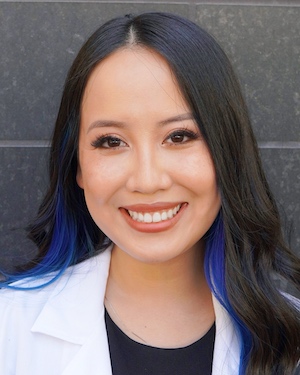
Are You New Here? ⟩
April 7, 2022, by Teresa
Getting Involved School/Life Balance
Yeah? Thinking about what you want your time here to look like? Then this one’s for you.
Growing up, I was that kid–the ASB, class president, honor society, involved in anything and everything type of kid. In undergrad, I took the complete opposite approach: focused my efforts on academics and dedicated any remaining time to a select few organizations I felt truly passionate about. Going into this program, I knew I wanted to maximize my two years here but was still figuring out what that meant and how it would be affected by . . . well, let’s just call them unprecedented times for old time’s sake.
I’ve held several roles in several student groups and programs here, including this one as student ambassador. I came into all of them during these infamous times and with that came a unique set of challenges, as I’m sure many of my fellow student leaders can relate to. So as I step out of my formal roles, here are some questions I’ve frequently gotten . . .
- How do I know what to get involved with? Obviously, the answer to this varies person to person. For me, I chose to get involved with things I felt aligned with my personal values, experiences, and goals which include advocacy, working with underserved communities, and mentorship. Identifying these are important because 1) no one can ever take their importance away from you and 2) they can be used to ground yourself if you ever lose sight of why you started the work in the first place. Working toward things you care about is always going to be a stronger motivator than doing things only because it’s what you think you’re supposed to be doing. This is not to say that you can only get involved with something you have a personal stake in. You can still be a strong ally, leader, and resource as long as you’re committed to putting in the work to understand and uplift larger causes.
- When should I get involved? With how short this program is, it may feel tempting to hit the ground running and take on everything all at once. Take the entire first semester to focus on school and establish a strong foundation so that you’re better able to gauge how much more you can take on. Take on more slowly over time if you are willing and able, but recognize your limitations. Becoming a leader is realizing that you are but a small, yet mighty, cog in a much larger machine. If you are no longer working, the entire system doesn’t work and the cause you serve pays the price. That being said, being proactive and reaching out to student organizations early doesn’t hurt! However, they will certainly provide you with more information to get involved when the time comes.
- What about the things I struggle with? They are inevitable growing pains, which hopefully subside as you progress and develop into your role(s). Be committed to receiving and applying feedback and getting out of your comfort zone. For me, this was role delegation and for several reasons: being hesitant to add more onto someone else’s plate, unlearning perfectionism, and learning to ask for help. I believe the hallmark feature of a great leader is the ability to empower others to become leaders themselves. This doesn’t happen when one person takes on everything, alone, operating in a silo. It happens when the dissemination of roles provides opportunities for emerging leaders to learn and grow.
- How do you stay organized? Definitely not without trial-and-error. In this age of technology and coupled with the pandemic, doing everything digitized became the new norm. While it works for some, I can say with confidence that it doesn’t work for me. Setting reminders, alarms, and notifications is sometimes effective but other times, I will simply swipe away or have my phone silenced and forget about tasks altogether. Out of sight, out of mind. I opt for paper-and-pencil because there’s just something so gratifying about physically crossing items off a list! This way, I am also setting spatial boundaries in addition to the temporal boundaries I will describe in #5. My phone is associated with leisure and social participation while my computer and planner are associated with work and productivity. Every person is different, try out various things and find what works for you!
- How do you balance involvement, academics, and your personal life? At the start of this program, I was determined to make the most out of an unfortunate situation so I did hit the ground running and poured myself into involvement and academics. During a presentation from the USC Kortschak Center for Learning and Creativity, we completed a Balance Wheel activity and mine was largely dominated by one color (work) and minimally by another color (sleep). Seeing this visual representation of myself as a two-dimensional occupational being forced me to assess whether I wanted my life to be a never-ending cycle of work, sleep, work, work, work, sleep, work. I did not, so I put boundaries in place. This included making a list of prioritized work instead of always tackling an endless and ever-growing “to do list.” This was followed by dedicating regular and reasonable hours toward these priorities and once these hours elapsed for the day, I would stop even if the work wasn’t finished. It’s fine–the work can wait. Stop and take the time to engage in your meaningful occupations–the ones which will re-energize you and keep you going.
To end this penultimate narrative, I emphasize how important mentorship is based on that which I’ve received and wished I’d received. My mentors have been both formal, through positions I’ve held and those who have guided me, as well as informal, through people I admire and who inspire me through their own work. There aren’t any hard and fast rules to what mentorship has to look like but being positioned to influence young minds is both power and responsibility and is not to be taken lightly. While it may require more effort and time on your part to invest in future generations, it is the hope that this kindness continues to be paid forward and improved upon year after year so that even once your time in the halls of CHP comes to an end, the causes you worked towards persist onward.
It appears I love leaving you with a quote of sorts, so we’re just going to go with it . . .
“Fight for the things that you care about, but do it in a way that will lead others to join you.”
— Ruth Bader Ginsburg
⋯

WOMEN ⟩
March 26, 2022, by Teresa
That’s it. That’s the post.
As Women’s History Month comes to an end, I’ve been reflecting on all the women who’ve helped shape me into the woman I am today while I learn how to use my voice for all the women to come. Here are some of them:
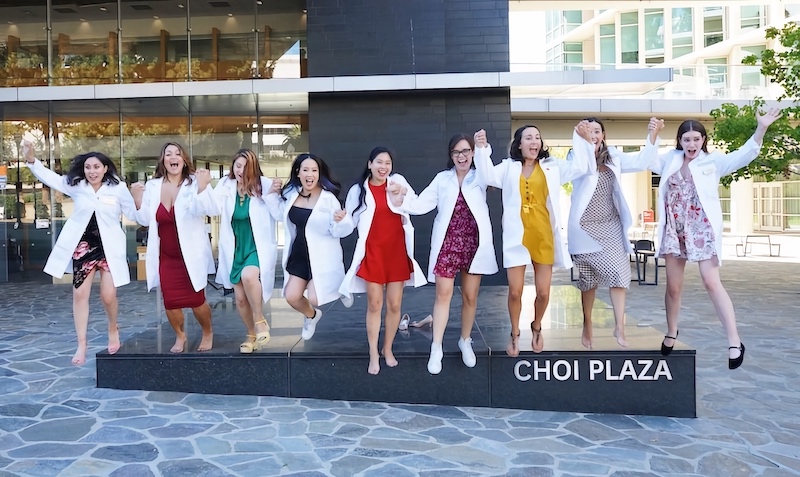
From left to right: Daniela, Michelle, Miranda, myself, Maggie, Denisse, Emily, China, Lizzo
Over 75% of occupational therapists in America are women and I can’t wait to become one of them. To enter a profession filled with such intelligent, warm, compassionate, and beautiful individuals such as the ones pictured alongside me here always reassures me that I followed the right path. Both in and out of the classroom, I learn so much from their strength, resilience, and experiences. With all of us being at Chan at the same time and learning from our professors who are some of the most powerful women I’ve encountered in this profession, we are constantly challenged to grow into our power as well.
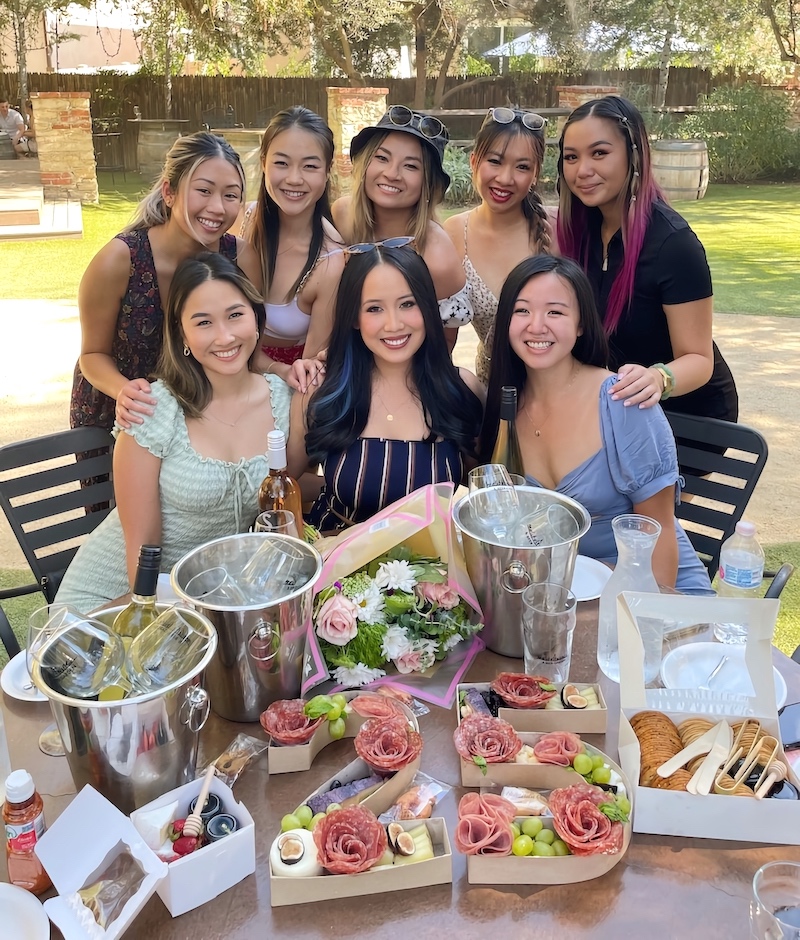
Top row from left to right: Michelle, Yuka, Courtney, Ann, Connie
Bottom row from left to right: Joan, myself, Kristine
From middle school to undergrad, I’ve found lifelong friends along the way and I am so proud of the women we’ve become and are on our way to becoming! It’s extremely empowering to see my friends achieving their goals and doing the things we talked about growing up. I love hearing their stories about their respective fields — marketing, medicine, accounting, nursing, business, social work — and only hope they feel the same whenever I talk about OT. At this point, I’m pretty sure they could give you a pretty good definition of what occupation is 😉 Whether it be moving across the country to start a new job, going to graduate school, or buying a home, I love to see my favorite women succeed. It motivates me to work toward my dreams as well, so that we can all celebrate our wins together. #WomenPostingWs
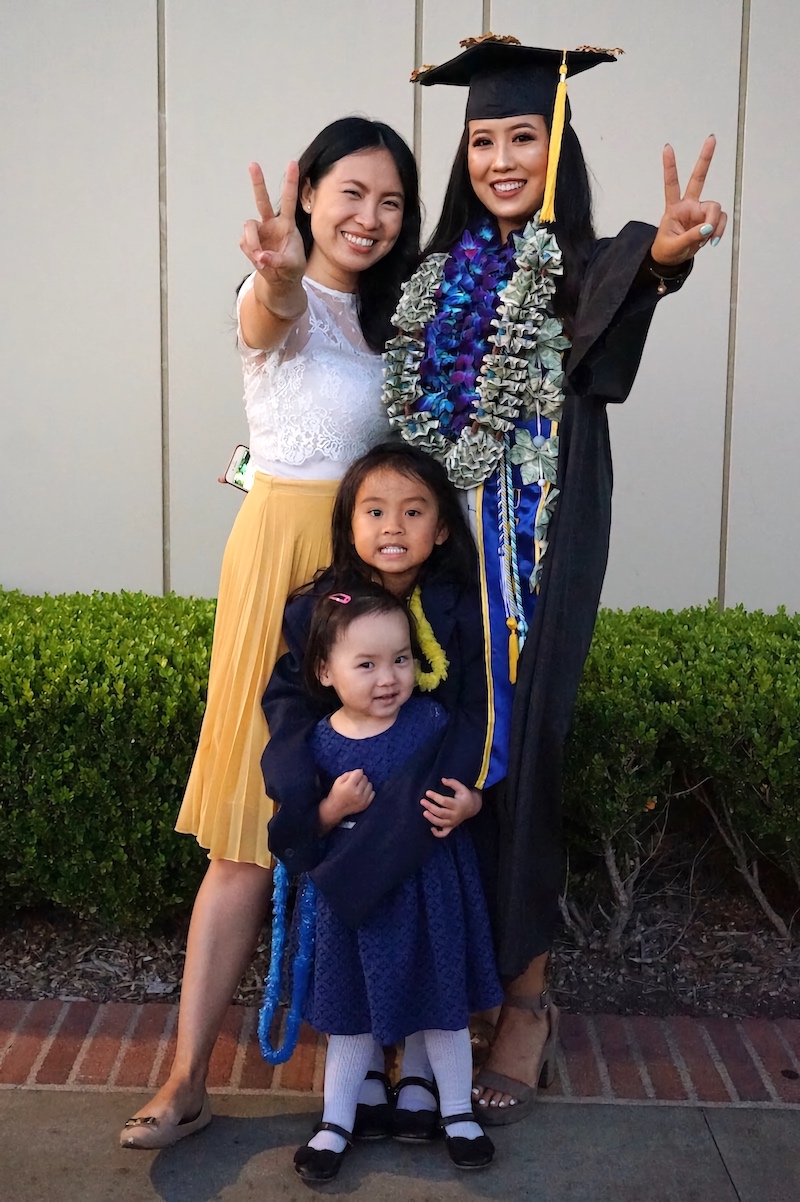
Me, my sister, Kim (USC Price MHA ’16), and our nieces manifesting Fight On ✌️ for me at my graduation from UCLA in 2018
Last but not least, there’s all the women in my family who have played a crucial role in who I am. Coming from a family of refugees and immigrants, obtaining degrees from all these fancy universities sometimes feels . . . snobby, even though it’s the very reason they came here – better opportunities for those who came after, for me. I think about this a lot and even more so once I became an aunt to two beautiful girls. While the strength, resilience, and sacrifices of my grandma, mom, aunts, and sisters have shaped who I am, my nieces help shape the woman I want to become.
When taken together, I am reminded of the complexities of being a woman, the many roles and expectations it comes with (both good and bad), and how this experience becomes further convoluted by things out of one’s control, including gender identity, being BIPOC, and the imposition of traditional gender roles. When I think about my own intersectionality, it is in relation to a new skill — learning how to use my voice to take up space. Growing up, I was told to become the docile, hardworking, obedient Vietnamese girl I was meant to be. As the youngest daughter, my thoughts often came last and my opinions were seldom considered as a serious contributor to the conversation. So as I grew into womanhood, being told that my voice mattered felt unnatural sometimes. It can still be difficult to organize my thoughts and convey them as a seamlessly delivered statement, without anticipating being silenced. I still haven’t figured out the surefire way to rectify this, but I do know how empowering it is when I use my voice and have folks right there alongside me, listening and lifting. I’d like to leave you with a poem I admire; it is my hope you use it to uplift the voices of all the women in your life, this month and every month until the end of time.
Hear me as a woman.
Have me as your sister.
On purpled battlefield breaking day,
So I might say our victory is just beginning,
See me as change,
Say I am movement,
That I am the year
And I am the era
Of the women.
“Won’t You Be My Sister?”
by Amanda Gorman
⋯

My Enemies Are After Me ⟩
March 2, 2022, by Teresa
Recently, I watched the stuff on Netflix about fraudsters and all I could think was “Wow, what I wouldn’t give to have their confidence.” Not to get anyone to send me $50,000, but because sometimes, it does feel like my enemies are after me . . . and by ‘my enemies,’ I mean the little voice in my head otherwise known as the “imposter.”
I felt like the biggest imposter ever when I was applying to OT school and when I started this program. If I had to rate my imposter syndrome on a scale of 0 (none) to 10 (worst) around this time, I’d put it at a 10. It was exacerbated both by being waitlisted and being fully remote. As I read the student ambassadors’ blogs, started meeting my classmates on Zoom, and learned from our amazing professors, I was simultaneously romanticizing this image of them in my head – that everyone else was so incredible and had it all figured out while I knew I always felt lost. I’d say I felt this way intermittently throughout my entire first year in the program.
In the past year, it’s resolved a lot. After 12 weeks of level 2 fieldwork, I felt my confidence increase as my competency in skills grew. Once we fully returned to campus last semester, I was comforted by hushed whispers from my peers who shared my confusion during classes. And then came two pivotal experiences this semester which mitigated my imposter syndrome significantly:
- An esteemed faculty member spoke to our class and shared that she still experiences imposter syndrome. That was just mind-blowing to me. There . . . was simply . . . no way? Not with all her achievements, success, and publications. Anyways, in OT, we love evidence-based practice, right? This individual urged us to search in our own history for evidence that we are indeed imposters in order to support the voice telling us we’re not good enough, don’t belong, or not ready for something. Here’s the punch line — you won’t find anything. You’re here at USC, doing the thing you set out to do, against all odds that might have stood in your way. The evidence speaks for itself.
- I heard this advice when I needed it most because it came at a time when I felt like other people were doing the romanticizing thing to me which I had been guilty of doing to others in the past. I had never seen myself as someone worthy enough to be looked up to, so to be placed in those situations felt . . . weird. Anyone who knows me knows that words of affirmation make me uncomfortable, which is something I am actively working on receiving better because it’s not me rejecting kind words, it’s the imposter. I want to see myself the way others see I have the potential to be, not in the distorted way the imposter tries to convince me of.
Going back to the baseline established at the start of this blog (which – you guessed it – we LOVE in OT), I’d say I now teeter around maybe 2 or 3. I entered “imposter” into the search bar on our website out of curiosity to see how I should frame this blog post and it returned ten blog hits from ambassadors past and present. They each approach it from a different perspective, which shows how pervasive imposter syndrome can be when you find yourself in a new or different environment that you’re not used to. But I think this also means you’re putting yourself in situations that challenge you to learn things you didn’t know before, experience growth throughout your life, and continue to prove people wrong, including that imposter telling you you’re a fraud. Sometimes, I hope I never rate my imposter syndrome at a 0 out of fear that it will indicate I’ve reached a threshold in my learning. Anyways, what I’m trying to say is you aren’t alone in this feeling. It can be difficult, but try not to compare yourself and your journey to others because we are only able to see what they choose to present to the world. Just give it some time. Both your confidence and competence will increase and with that, maybe you’ll learn to befriend your ‘enemies.’
⋯

To All the Waitlisted Applicants Ambassadors Have Loved Before: P.S. We Still Love You ⟩
January 27, 2022, by Teresa
If you’re reading this, it’s likely you were waitlisted. If you were waitlisted, you’ve probably been binge-reading some blog posts from ambassadors of years past. You know the ones I’m talking about — those from Calvin, from Liz, from Marilyn, from Daniel, from Kat. Maybe you’ve read them twice. Who are we kidding? You eat, sleep, and breathe their words. You hang onto their stories because they give you hope. They provide comfort when you feel most uncertain, guidance when you can’t find it in those around you, and you exit the tab feeling reassured that everything is going to be okay.
Not too long after, your family asks, “Hey, have you heard back from USC? I know you’ve been waiting.” Maybe you open social media or scour online forums and see all the other students who got in. Or you just interviewed for a part-time job in the meantime and they ask, “Where do you see yourself in 5 years?” Suddenly, things once again do not feel like they’re going to be okay. So you read another blog, go through the same motions, and continue a vicious cycle that doesn’t seem like it’s ever going to end until you finally get the “Congratulations!” email. Even though you know it’s a vicious cycle, you can’t help but feel this way because your life feels like it’s at a standstill, your future lies in the hands of someone else, and you have no control over any of it.
I know the feeling. Replace all the “you”s above with “I” and they were my same thoughts two years ago when I was waitlisted. Although so much time has passed, I still remember it vividly. If you’re looking for another comforting blog, I’m sorry to inform you this is not it. Generations of ambassadors before me have discussed being waitlisted and I highly recommend them all. Here, I want to share with you some things on my mind during this time, never admitted to anyone else, instead internalized, and took with me into the program which manifested as “imposter syndrome.” (But we’ll talk about that another time.) Looking back, I wish I could go back in time, give myself a hug, reframe the negative self-talk, and instead tell myself what I really needed to hear.
“I wasn’t accepted because I am not good enough.”
Maybe you don’t feel you accurately conveyed who you are through your essay (as if anyone could in “X” amount of characte–). Maybe you’re doubting if it was because of the typo you caught after submitting or your improper grammar, even though English isn’t even your first language. Maybe your GPA wasn’t as high because you went to a competitive school, or you worked multiple jobs during college to pay bills and tuition, or you have other living, breathing human beings relying on you for their survival. Do not write any of these off as “excuses” — all of these are very valid. I’m here to tell you all of that is okay, you don’t need to explain yourself to anyone, and this absolutely does not define your worth as a future OT and more importantly, as a human.
“If I don’t get in this year, I should work even harder to get in next year.”
I remember repeating this to myself and to others so often that as I reflect back on it, I want to cry because of how much my heart aches for this person I used to be. In retrospect, I was working so hard that I can’t imagine how I could have worked any harder for the next application cycle. I took on more shifts as a rehab aide and became one of the first people in my circles with COVID. Listen — nothing is worth risking your health. As future OTs, we need to deemphasize “hustle culture,” especially when it infringes upon our health and happiness.
“Even if I do get in now, it’ll only be a pity acceptance. I didn’t deserve it or earn it.”
So yes, if you get accepted now, it’s because someone who was offered a spot turned it down and chose another path for themselves. My advice? I’m a firm believer in putting out the type of energy into the world that I want in return, so for whoever’s spot you’re “taking,” wish them well as they continue on their OT journey. And once you’re in? Focus on yourself and not how others are doing in comparison to you. You’ve been given a clean slate to start over and move forward.
“Everyone else who got in before me will have more time to prepare.”
Even while you’re waitlisted, begin to think about how you’ll handle housing, transportation, and finances. Beyond that, there is little to no preparation required of you. I know people who were accepted the week before, the day before, and even a day after the program had already started. It all works out and here at Chan, they do everything in their power to make sure it does–you need only ask for help. If you were accepted, if you were waitlisted, if you were none of the above and just a random person reading my blog by happenstance, go and LIVE YOUR LIFE!!! Go climb a tree, take a spin class, jump off a plane whilst strapped to another person and relying only on fabric to catch you, learn to sew, hug your dog, kiss your cat, touch some grass, LIVE LIFEEEEEE!!!!!!!!!!! I believe there is no better preparation for starting a graduate program than living your life to the fullest. It is so powerful and restorative to just do something for YOU with no underlying objective other than it would make you happy. It doesn’t advance your career, it doesn’t serve others, it might not even make sense to the world. Take this time to really focus on what makes you happy and think about how you might embed it into your life once you get into school. Engage in your favorite occupations. But safely. I think I’m legally obligated to clarify that I am not liable if you climb a tree. Just kidding (kind of). Live your life. Y’all be safe, though.
“Everyone is going to be so close already and I’m going to feel like an outsider.”
At the start, interactions are so face-value. It’s a lot of small talk, niceties, and formalities. Lots of reading and re-reading your carefully curated introductory profile before posting it. Honestly, it wasn’t until I started the program and got to hear people’s thoughts in class that I thought, “I could really get along with this person on so many levels.” Like yes, it’s so lovely to learn that someone is from the same area as you or that you share the same favorite ice cream flavor, but I came to USC Chan to make meaningful connections with like-minded people whose vulnerability encourages me to grow as a future OT and as a person. Two years later, I’m still having moments like that and making new friends. Don’t worry, there’s time.
“Everyone’s going to know.”
Nobody’s gonna know. How would they know? In fact, most of my classmates who are reading this are probably finding out this information about me for the first time. If you don’t want people to know, you don’t have to tell them. However, if you choose to and people view you differently as a result, it says nothing about who you are.
And most importantly, “I am not going to get any swag.”
“I do not have enough swag,” Teresa writes while sitting atop her mountain of USC Chan pens and foam fingers. “I definitely have more room on my backpack,” she convinces herself while being crushed under the weight of the many buttons she has accumulated over the years. Obviously, I’m kidding. But also . . . get your Chan swag! There will be so many future opportunities and I encourage you to take advantage of them all.
I was actually waitlisted at all three schools I had applied to and told myself I’d commit to wherever I heard from first. I was accepted to all three, with USC being the first and it happened to be my top choice — a big reason for that being the holistic admissions process implemented here and the way Dr. Anvarizadeh spoke about it so passionately. Even though I believe this process to be the most equitable and forward-thinking for the advancement of the OT profession, as with most systems, it is not fail-safe and I knew that going into the application process. I trusted the process anyways, everything worked out how it was supposed to, and I have no regrets, including being waitlisted. It reminded me that who you are on paper and were in the past does not define who you are today and more importantly, who you are on your way to becoming. I feel immensely honored to join the incredible group of ambassadors who were waitlisted and are now some of the most influential mentors I’ve ever had. So whatever the outcome, just know that I’m right here waiting alongside you to join us, too.
Don’t hesitate to reach out to .(JavaScript must be enabled to view this email address) if you’d like to connect!
⋯

ABC and 1, 2, Three ⟩
December 29, 2021, by Teresa
With the way the Master’s program is set up, there are 3 practice immersions, which is an 8-unit course you take each semester that focuses on a primary area of practice in occupational therapy. The focuses are on adult physical rehabilitation, mental health, and pediatrics. (For the entry-level OTD, there will be an additional practice immersion focused on productive aging and geriatrics!) My entire class is split up into 3 different cohorts of about 40 students and each cohort takes these practice immersions in a different order. I’m in Cohort C, meaning I started the program last year taking pediatrics, adult rehab last spring, and just recently finished mental health this fall. In honor of the third to last day of Blog-mas, I’ll be sharing 3 main takeaways I learned during each of the 3 practice immersions!
Pediatrics
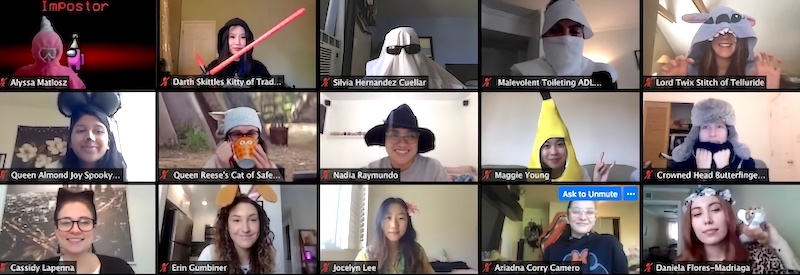
Fall 2020 feels like a fever dream. I miss it, though. *sigh*
- In this immersion, we were introduced to the infamous documentation process. We learned how to take SOAP notes as well as the importance of documentation. Being an OT is not just delivering services to a client — you have to take notes on what you did so you can remember, so that other providers can reference them, and so that you are properly compensated for your services!
- We also learned about how your “client” not only includes the one person you directly provide OT services to, but also encompasses their family and/or support system. It’s important that you include the appropriate people as part of treatment, because they can offer pieces of information which will be vital during the treatment process!
- One of my biggest hesitations about working with children was not being able to speak with them verbally in order to elicit what their needs are. However, we learned about signs and methods of nonverbal communication, many of which apply to adults as well!
Adult Physical Rehabilitation
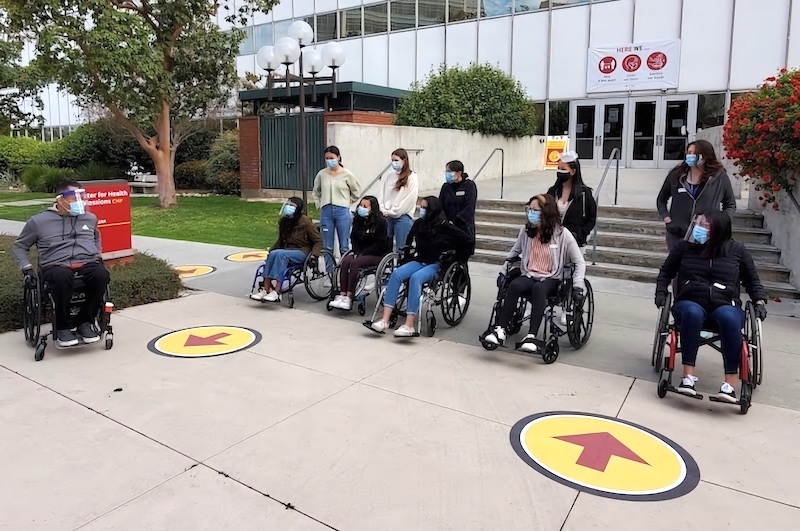
Getting to go on campus once a week for hands-on practice immersion labs and meet my classmates in person during Spring 2021 was such an exciting time!
- In this immersion, we learned about the evaluation process in further detail and how important it is to establish a baseline during your first encounter with a client because it will determine what the rest of their treatment looks like. However, with OT being such a holistic profession, there are so many things you’ll want to know about your client from the start! This immersion is scaffolded so wonderfully and in harmony with the fieldwork experiences that by the end of the semester, you become comfortable with this process!
- Almost every class, we’d hear that the most important thing to remember when working in an adult rehab setting is to “meet people where they’re at” — both physically and mentally. If your client is unable to stand, meet them where they’re at and have a seat yourself — don’t physically talk down to them. Additionally, your clients are the experts of their own lives and the last thing you want to do is have them overexert themselves, so make sure your interventions match their capacities and goals!
- In keeping with that, never assume someone’s capability, identity, or thoughts. Foster an open space to nurture and maintain the therapeutic relationship between you and your client. For example, USC provides us with name badges that include our pronouns (mine are she/her/hers) and the presence of this alone has sparked many important conversations during my fieldwork experiences. Again, they are the experts of their own lives, so check in with them often to make sure their needs are being met.
Mental Health
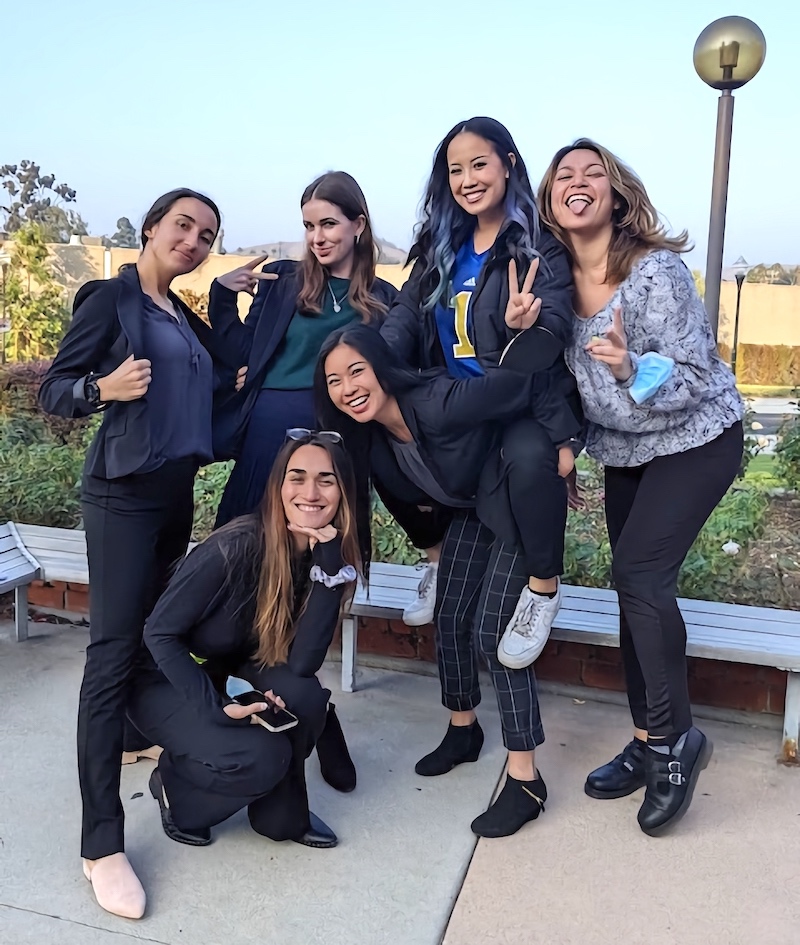
The best Team-Based Learning group to ever exist! Gimme, gimme MORS, gimme MORS, gimme, gimme MORS 😢
- In this immersion, we learned how important it is as entry-level OTs to use standardized assessments correctly as we garner experience and continue to develop our clinical identity. These assessments are founded on evidence-based practice and were developed and researched with a clear purpose in mind to guide the treatment process in a way that is proven to work!
- In certain areas of OT practice, there is also a need for providers to “do whatever it takes” in order to facilitate your client’s recovery which may extend beyond traditional care. While this may sound intimidating, it aligns with the holistic approach of occupational therapy in that it emphasizes how each individual requires unique, individual needs and requires providers to immerse themselves in the process in order to meet these needs.
- Maybe it was because this was our first semester fully in-person, but I was able to truly understand the importance of teamwork within any group setting — from the classmates you sit next to every day, to your cohort, to your entire graduating class, as well as the teams you’ll go on to be a part of as an OT. For any given topic, everyone in a team will offer a different perspective which you might not have picked up on because you, yourself have a different perspective based on who you are as a person and not that any perspective is the right or wrong one, but the collaboration offers a space for boundless solutions.
To end Day 3, I’d also like to feature the 3 cohorts of the Entry-Level Master’s program class of 2022! Cheers to everything you’ve all accomplished in 2021 and here’s to all the memories to be made during our last semester together!
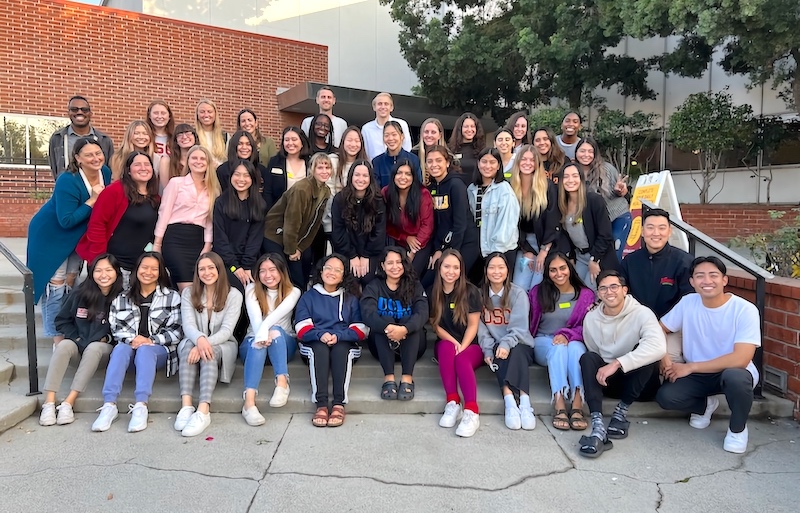
Cohort A (Photo courtesy of Earl Sy)
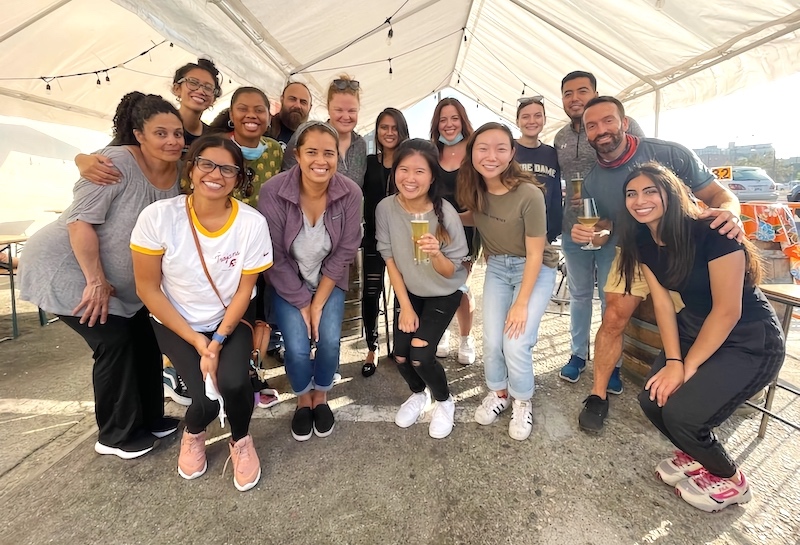
Some of Cohort B (Photo courtesy of Stefanie Kuizon)
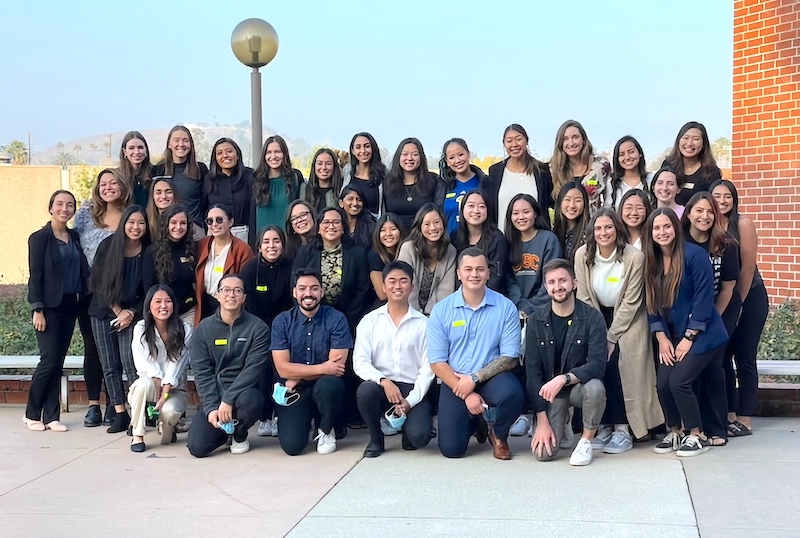
Cohort C (Photo courtesy of Camille Hazen)
I cannot wait to see you all become some of the best occupational therapists this profession has ever seen. ❤️
⋯





